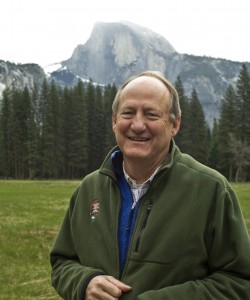
Dayton Duncan thinks he has the greatest job in America. The author of 12 books, Duncan is also Ken Burns’ longtime collaborator on numerous documentary series, including The National Parks: America’s Best Idea, a celebration of the 59 large natural spaces protected and preserved by the National Park Service.
Duncan discussed The National Parks and other projects during a visit to NPT for a screening and reception earlier this week. The event was part of a celebration marking the 100th anniversary of the National Park Service and the nationwide PBS rebroadcast of the 12-hour 2009 series in two-hour blocks April 25 through 30, beginning at 8 p.m. Monday through Friday and 8:30 p.m. Saturday on NPT.
Addressing an audience of NPT viewers, Duncan shared stories from the creation of The National Parks and answered questioned about it and other projects, including Burns’ upcoming country music series. He also showed three clips from The National Parks, among them the introduction segment with sweeping views of parks and narration by Peter Coyote and a clip of a Park Ranger reminiscing poetically about seeing a herd of bison in the snow.
Revisiting the series now is like watching home movies, Duncan said. He was on virtually every trip and every shoot, and related one particularly time-consuming and ultimately dramatic experience waiting for Denali, formerly Mount McKinley, to appear. When it did, the crew — Burns included — watched astonished with eyes and mouths open wide. In the end, they decided to use a time-lapse sequence to share that reveal with viewers. The idea for the series grew out of Duncan’s own experiences in the parks over the years researching his own books and other documentary projects with Burns. “It took me about 45 seconds to convince Ken,” he told the audience at the NPT reception.
Duncan compares his work with Burns and Florentine Films to pursuing “self-directed post-graduate degrees” on topics of his choice, followed by working on films with his best friend, “who happens to be the best documentary filmmaker in America.” Duncan spent 16 years working on The National Parks, including six years of production and editing time to allow for multiple visits to the parks, partly to counter inclement weather and bad shooting conditions, partly to allow for visits to parks in different seasons. Duncan said he hoped this national rebroadcast of the series would do essentially what the first run did seven years ago: encourage people to go to the parks. “They’re beautiful places, they belong to you, you’re a co-owner,” Duncan said. “Go check this property out, do a property inspection of the stuff that belongs to you.”
Duncan has been an avid parks-goer from a young age. “When I was 9 years old, the only real vacation my family took from my small town in Iowa was west to national parks. I can still remember almost the day-by-day itinerary of that,” Duncan said. “I didn’t come back from that trip thinking, I know what I’m going to do now, I’m going to end up being a writer and filmmaker whose focuses are mostly on our land and our landscape and how that intertwines with our history,” he continued. “Now that I look back and see what I became, I realize that seed was planted on that first trip and my affection for the parks and what role they can play in opening up your mind and your horizons was established back then.”
His 9-year-old self probably would be amazed at another development in his life and career: In appreciation of their work on The National Parks, Duncan and Burns were named honorary park rangers, something bestowed on only about 50 people, “most of them dead presidents,” Duncan quipped. And, yes, the filmmakers also received the distinctive flat-brimmed hats worn by rangers.